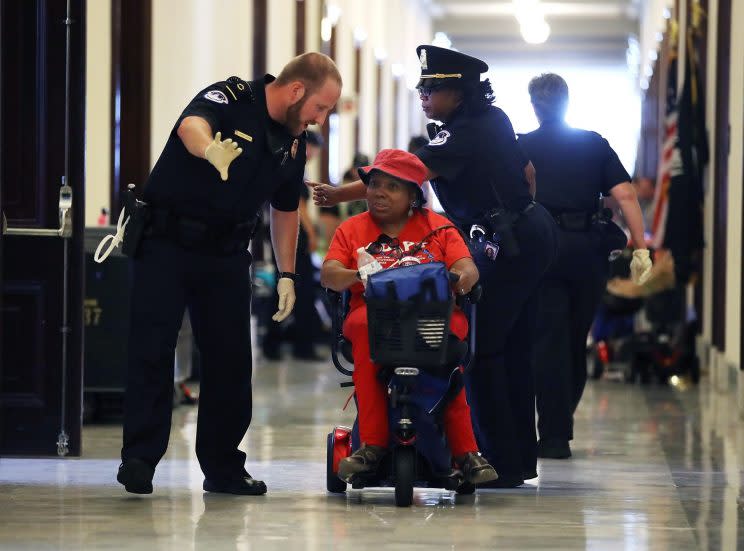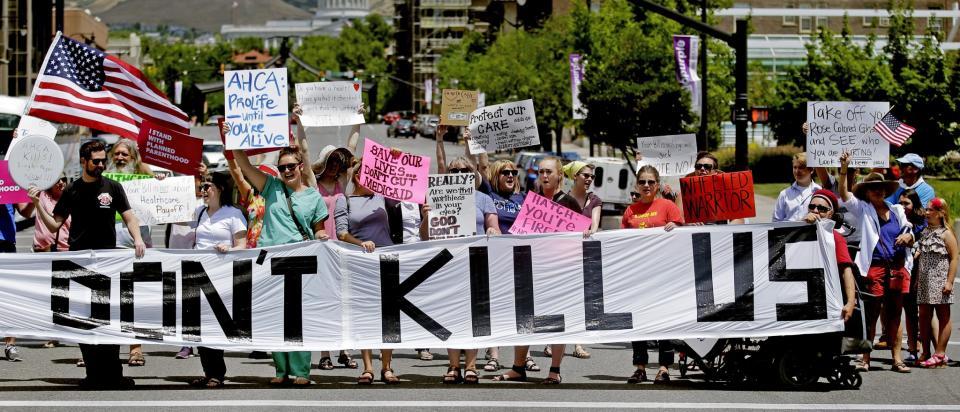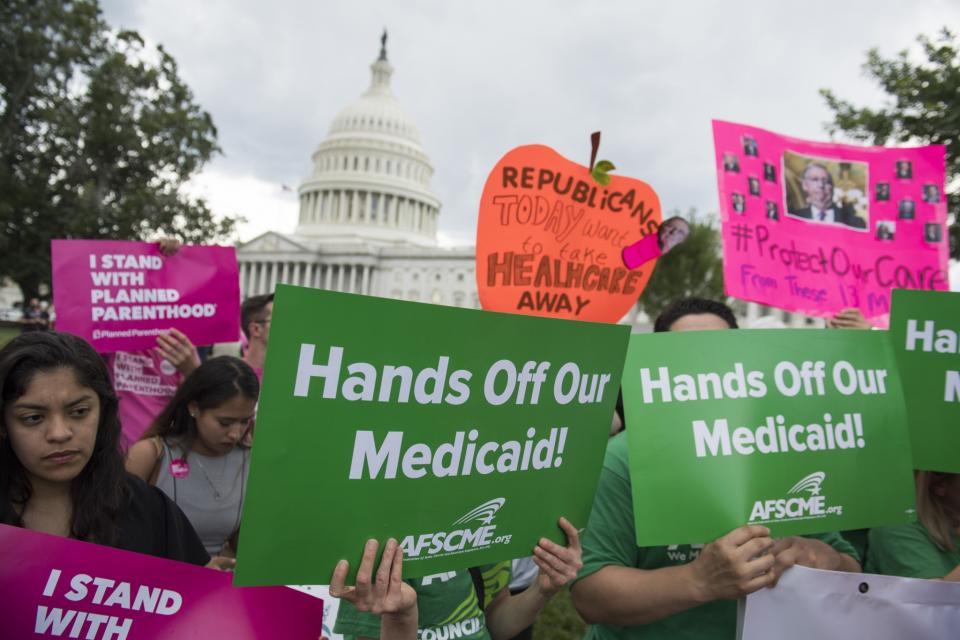Three weeks in July: Opposition groups gear up for next phase of health care fight

WASHINGTON — On Tuesday in Pittsburg, Kan., disability rights activists protested against the Senate Republican health care bill that would slash Medicaid funding and roll back Obama’s expansion of the program. They protested in Salt Lake City and in Colorado.
It was just one small example of the grassroots effort to target Republican senators in their states that’s become a feature of the political world under Trump.
“You want to know who’s really doing the best [opposition work]? It’s random people out there who are just upset,” said a senior Senate Democratic adviser Monday night, before going on to correctly predict that Senate Majority Leader Mitch McConnell would not be able to get the votes to bring the Better Care Reconciliation Act to passage in its current form. People in the home districts of U.S. senators are telling their stories, making phone calls and organizing rallies — and all of that, the staffer said, coupled with a full-court press in the media and in Washington, was making a difference.
It was a wild 24-hour period that saw Democratic New Jersey Sen. Corey Booker and Georgia Rep. John Lewis holding an impromptu health care town hall on the steps of the Capitol as night fell Monday and President Trump calling on short notice a meeting of all the Republican senators Tuesday afternoon. MoveOn, Planned Parenthood, the Progressive Change Committee and a slew of other groups and Democratic senators and representatives held a rally in front of the Capitol Tuesday afternoon, complete with free pizza, with two more planned for Wednesday.

That D.C. coalition has been rallying against the Republican health care bills in Washington since May, but it’s on-the-ground actions around the country — and calls from constituents to key senators — that have helped set the tone in members’ districts.
Now the activists are gearing up for the next phase of the fight.
“The vote would not have been delayed without the constituent pressure that we’ve seen all across the country,“ Indivisible tweeted to its 182,000 followers, which is how people communicate now, rather than releasing formal statements. “But delay does not mean dead; it means this recess will determine whether the bill dies once and for all or lives to see another day.”
“July 4 recess is your moment,” the group said, encouraging its supporters to read up on “advocacy tactics that work” and download a Trumpcare Toolkit. “Do not forget what happened in the House. Paul Ryan called ACA ‘the law of the land,’ then brought his bill back from the dead weeks later.”
Related slideshow: ‘Die-in’ protesters dragged away from McConnell’s office >>>
Indivisible co-founder Ezra Levin was more explicit: “So McConnell has some time, but we have 2 big things on our side: this awful bill is now public, and the public is on our side,” he tweeted. “We should be making July 4 recess plans NOW. Your Senator is back home — let them know how you feel. Congress is in session for 3 weeks between July recess and the very long August recess. This is when Republicans will try to get it done.“
The Progressive Change Campaign Committee said it was sticking to a plan to release an advertisement in West Virginia Wednesday targeting Sen. Shelley Moore Capito over the bill’s reduction in funding for Medicaid. “We’re doubling down on pressuring Shelley Moore Capito to oppose any Medicaid cuts after she tepidly opposed Trump’s bill ‘as drafted,’” said PCCC co-founder Adam Green.
The longer the bill is out for the public to see, the better the odds of rallying support to halt it, progressives believe. It was harder to get people’s attention and train it on a bill that was a secret and had no Congressional Budget Office score. Now the bill is scored, and public.

“My sense is that two weeks ago, call volumes were down significantly. But they are ramping up — especially over the past week. We’re now back to the early resistance days where people call multiple times a day and get voicemail boxes. That’s especially [the case] for the targeted, the swing Republican senators,” Ben Wikler, Washington director of MoveOn, told Yahoo News.
Related slideshow: Protesters across the country oppose GOP’s health care plan >>>
Overall call volume may still be down compared to some of the fights earlier in the year, such as the one against the nomination of Betsy DeVos as education secretary, but those fights involved mobilizing opposition against Democrats and Republicans, and many of the calls went to senators like California’s Dianne Feinstein.
This time much of the effort is being directed at mobilizing constituents against seven Republican senators from less-populous states.
It’s pressure that’s sure to get more intense in the days ahead.
Read more from Yahoo News:



